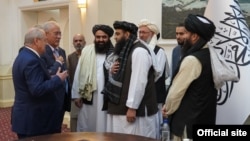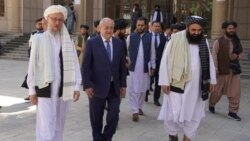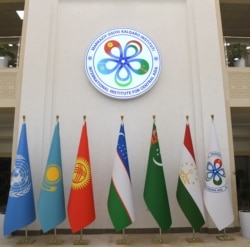Central Asian republics are stepping up their diplomatic activity in the face of the Taliban takeover of Afghanistan, seeking to balance fears of increased extremist activity in the region against the risk of an economic collapse that could send refugees flooding across their borders.
Three of those republics — Uzbekistan, Tajikistan and Turkmenistan — joined Russia, China, Iran and Pakistan in issuing a joint statement from Tehran on Thursday, expressing support for the Afghan people while urging the nation’s new Taliban rulers to form an inclusive government representing all social and ethnic groups.
The issue is particularly sensitive for Uzbekistan and Tajikistan, both of which have large ethnic populations in northern Afghanistan hugging their borders. Uzbek Foreign Minister Abdulaziz Kamilov has recently visited Kabul and met with key Taliban players.
The call for an inclusive Afghan government has been a common global refrain, but where Western governments have sought to pressure the Taliban by withholding aid and access to the nation’s fiscal reserves, regional foreign ministers are stressing respect for Afghanistan’s sovereignty, independence and territorial integrity, as well as non-interference in its internal affairs.
The enhanced diplomatic engagement is driven in part by political calculation. Central Asians want the Taliban to suppress potential acts of terrorism against them and dampen the spread of extremism.
“Obviously, the Taliban takeover is not the most pleasant development,” said Dauren Abayev, deputy chief of staff to Kazakhstan’s president, in a public forum this week. “But if you compare them with other groups, it is the not the worst case.”
Afghanistan’s neighbors take some comfort from verbal reassurances delivered to Uzbekistan and others. Last week in Moscow, Taliban Foreign Minister Amir Khan Muttaqi said: “Afghanistan will never allow its soil to be used to threaten the security of another country.”
But the neighbors are equally concerned about the nation’s economic stability. For weeks, Uzbek, Kazakh and Kyrgyz officials have urged international partners to help avoid a humanitarian catastrophe that would destabilize the region further.
Talgat Kaliev, Kazakhstan’s special representative, told Euractiv, a pan-European media network, that his country is continuing to provide humanitarian aid
“It is necessary to create conditions for dialogue with the new government, regardless of its political attitudes and ideologies,” he said.
Kyrgyzstan, too, has delivered humanitarian aid, with Taalatbek Masadykov, deputy chairman of its Security Council, telling Kabul that his country wants peace and stability.
Turkmen officials are in Kabul this week, discussing a prospective pipeline project that, when completed, will link their natural gas-rich country through Afghanistan to Pakistan and India. Under construction in Afghanistan since 2018, the so-called TAPI project could carry 33 billion cubic meters of natural gas per year from Galkynysh, Turkmenistan, to Fazilka, India.
Mohammad Issa Akhund, the Taliban’s acting minister of mines and petroleum, said in a statement that Kabul has been “working hard for some time” and takes pride in the project. Afghanistan would take 5% of the gas, with the rest equally divided between Pakistan and India. Kabul hopes to earn transit fees.
One outlier in the regional diplomacy is Tajikistan, which has been openly critical of the Taliban while expressing support for Afghanistan’s ethnic Tajiks.
But Temur Umarov of the Carnegie Moscow Center writes that despite President Emomali Rahmon’s harsh rhetoric, Tajikistan has been extremely cautious, “limiting their criticism to the fact that Afghanistan’s new government is not inclusive enough of the country’s ethnic minorities.”
This summer Rahmon promised to accept up to 100,000 refugees, a pledge his interior minister Ramazon Rahimzoda later walked back, blaming the international community for failing to assist.
Dushanbe says there are some 15,000 Afghan refugees in Tajikistan. The State Committee for National Security recently reported up to 600 Afghans trying to cross the border daily.
Uzbekistan takes pride in opening the first channel of communication with the Taliban in the region and refers to it as Afghanistan’s “interim government.”
“Dialogue is key,” said Furkat Sidikov, Uzbekistan’s deputy foreign minister, while expressing confidence to VOA that even Tajikistan is in synch on Afghanistan and that disagreements can be worked out. “We will not leave any country in fear or concern … We are closely working with each other on Afghanistan.”
For Uzbekistan, Afghan policy is not about the Taliban but “the people of Afghanistan,” officials in Tashkent reiterate. Yet it is about Uzbekistan’s self-interest too.
“Peace there is essential for us,” said Sidikov.
Tashkent has opened the border town of Termez to the international community to serve as a hub for humanitarian assistance to Afghanistan — a temporary and ad hoc arrangement.
UNHCR, the United Nations refugee agency, this month conducted three emergency airlifts to Termez, delivering more than 100 metric tons of shelter materials, blankets, plastic sheeting and supplies. The aid is trucked from Termez across the border to Mazar-i-Sharif while Afghan airports remain closed to commercial traffic.
“The border is peaceful. We are not doing this for propaganda… We don’t want our neighbors to suffer,” Sidikov said.
The deputy foreign minister confirmed that Uzbekistan will help Afghanistan repair the Mazar-e-Sharif airport and continue to supply the nation with electricity. Afghanistan can no longer pay, but Tashkent has deferred payment assuming the Taliban will eventually win financial support. To that end, Uzbekistan has called on international financial institutions and donors to unfreeze funds.
In forums ahead of Uzbekistan’s recent presidential election, the Mirziyoyev administration showcased regional diplomacy as its signature foreign policy success.
“Cooperation with Central Asian partners is the top priority,” said Sidikov. “Uzbekistan’s trade within the region nearly doubled from $2.7 billion in 2016 [when President Shavkat Mirziyoyev took power] to $5.2 billion this year.” Afghanistan comprises nearly one-fifth of this commerce.
In Tehran, Uzbek Foreign Minister Kamilov urged the world not to isolate Afghanistan, saying, “The international community needs a post-conflict strategy.”
“Uzbekistan is the driver of connectivity in Central Asia,” said Sidikov, Kamilov’s deputy. “We can build a common future, respecting each other’s interests. The interim government in Afghanistan wants this, too.”
Bakhtiyor Mustafayev, deputy head of Tashkent’s International Institute for Central Asia, is encouraged by the fact that all the Central Asian governments, which long acted as rivals, now endorse the idea of connectivity, taking advantage of each others’ unique strengths, “from human capital to natural resources.”
Mustafayev argues that the region has learned lessons from 30 years of independence since the breakup of the Soviet Union: It needs to act and speak collectively and “every state has political will to create that regional space.”
Sherzod Muhammad Ashraf, an ethnic Uzbek from Afghanistan currently based in Tashkent, is happy with this intensified Central Asian focus. “I like that Uzbekistan and others see Afghans as one nation, but minorities have struggled and yearned for respect.
“I hope our neighbors take that into account with the Taliban, because they don’t represent us,” said Ashraf. “I’m happy with calls for inclusive government that involve all ethnic groups.”
This story originated in VOA's Uzbek Service.






